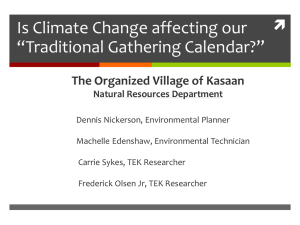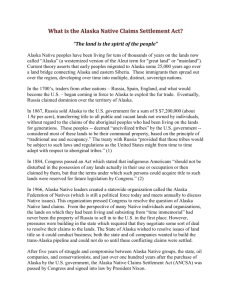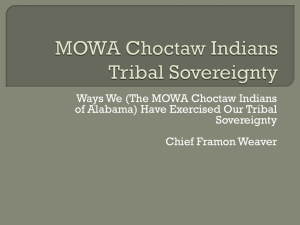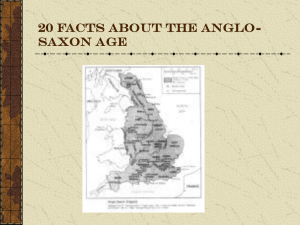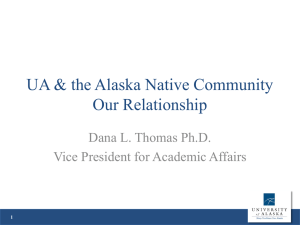Jaeger – Land into Trust for Alaska Tribes
advertisement
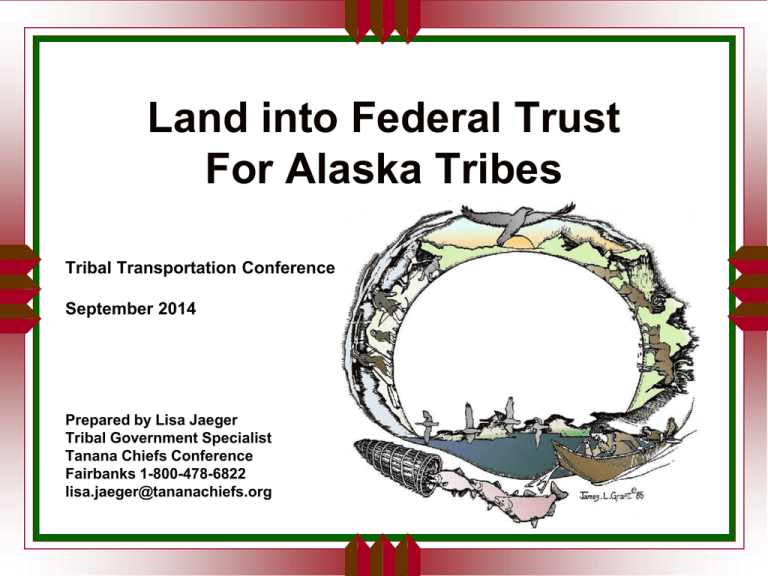
Land into Federal Trust For Alaska Tribes Tribal Transportation Conference September 2014 Prepared by Lisa Jaeger Tribal Government Specialist Tanana Chiefs Conference Fairbanks 1-800-478-6822 lisa.jaeger@tananachiefs.org Placing tribal land in trust means that the United States government holds legal title to the land for the benefit, use, and occupancy of a federally recognized tribe. The U.S. Government’s name is on the deed as the owner of the property. Implications….increased federal oversight but also potential increased tribal jurisdiction Indian country Land Into Trust – Background Prior to ANCSA there was a great deal of land in Alaska in trust, some very large reservations and many reserves…some 150 reservations and reserves In 1971 ANCSA terminated all reservations in Alaska except Metlakatla In 1978 a legal opinion of a BIA solicitor stated that through ANCSA, Congress had intended to permanently remove all Native lands in Alaska from trust status In 1980 the BIA created an ‘Alaska Exception’ for taking land into trust in Alaska…BIA regulations prohibit taking tribal land into trust. In 2007, Akiachak Native Community v Kenneth Salazar (Secretary of the Interior, Defendant and the State of Alaska (intervener) 4 tribes filed a lawsuit claiming that the ‘Alaska Exception’ was discriminatory In March 2013, the U.S. District Court of Columbia issued a judgment in favor of the tribes. ANCSA did not prohibit the Secretary from taking land into trust and the ‘Alaska Exception’ diminished the privileges and immunities available to federally recognized tribes. Both the Secretary of Interior and the State of Alaska appealed this decision. In November 2013, the Indian Law and Order Commission report, A Roadmap for Making Native America Safer, recommends taking land into trust in Alaska to improve public safety options. In December 2013, the Secretarial Commission on Indian Trust Administration and Reform established by the Secretary of Interior recommended allowing Alaska Native tribes to have tribally owned fee simple land taken into trust. April 2014, Department of Interior puts forth a proposed rule that would lift the ‘Alaska Exception’ and allow the Department of Interior to take Alaska tribal fee land into trust. A hearing was held in Anchorage in June, and the comment period extended. Carcieri (Rode Island Governor) v Salazar (Secretary of Interior) Carcieri v Salazar, Supreme Court 2009: The Narragansett Tribe in Rhode Island was federally recognized in 1983. The tribe purchased 31 acres of land to be used for elderly tribal member housing and asked for it to be taken into trust under the Indian Reorganization Act. Rhode Island opposed, sued, and ultimately the US Supreme Court ruled that since the IRA says that land can be taken into trust for tribes “now under federal jurisdiction” that the Narragansett land could not be taken into trust because they were not recognized in 1934 when the IRA was enacted. ‘Carcieri Fix’ S. 2188, legislation that would overturn the Supreme Courts decision in Carcieri v Salazar. In front of Congress now. Broadens the tribes that the Secretary of Interior can take lands into trust for to include any federally recognize tribe (as opposed to only those recognized in 1934). Opposed by the State of Alaska, Governor through the Attorney General’s office who proposed the following language: • Section 5 of the Act of June 18, 1934 (25 U.S.C. 465) is amended in the first sentence by striking “The Secretary” and inserting “Except in Alaska, the Secretary.” If the rule is adopted and Congress doesn’t create an ‘Alaska Exception’, the BIA would consider taking land into trust on a case by case basis, but would not be mandated to take it into trust. The opportunity to take land into trust would be opened. Obstacles include the likely protest by the State of Alaska on applications and ‘clouds’ on some titles. Implications of land in trust Land held in trust has great protection from loss Tribes have more authority/jurisdiction over lands held in trust Land held in trust would have more federal oversight (i.e. permission to develop, mortgage, or sell) Lands held in fee simple title by the tribes (tribe’s name is on the deed) would be the most likely type of land that could be taken into trust. Alaska tribes have acquired land in fee simple status in a variety of ways: Large and small transfers from village corporations to tribes Transfers from city governments Alaska Native Townsite lands where cities did not form Purchase and gift Venetie Arctic Village 1.8 million acres Venetie land held in fee-simple title by the Tribe, both surface and subsurface. Transferred from Two village corporations In the 1970s. Eagle Alaska Native Townsite Lots with ‘E’ owned by Tribe in fee simple title. Village removed in 2009 flood Birch Creek Checkerboard pattern Of ANCSA settlement Core township surface (64,000 acres) owned in fee simple by the Tribe Also, the Village sits on an Alaska Native Townsite Grayling Alaska Native Townsite Lots with ‘G’ transferred from City to Tribe Telida Native Allotment Purchased by Tribe Most of the tribal Law and Order Commission Report Recommendations for Alaska revolve around taking land into trust to increase tribal jurisdiction over it Congress should overturn the Venetie tax case decision by amending ANCSA to provide that former reservations lands acquired in fee by Alaska Native villages and other lands transferred in fee to Native villages pursuant to ANCSA are Indian country. Congress and the President should amend the definition of Indian country to clarify or affirm that Native allotments and Native-owned town sites in Alaska are Indian country. Congress should amend ANCSA to allow transfer of lands from Regional Corporations to Tribal governments, to allow transferred lands to be put into trust and defined as Indian country in the criminal code, to allow tribes to put tribally owned fee simple land into trust, and to channel more resources directly to Alaska tribal governments for the provision of governmental services in those communities Congress should repeal section 910 of the amended VAWA legislation Congress should affirm the inherent criminal jurisdiction of Alaska Native Tribal governments over their members within the external boundaries of their villages If the path is opened for tribes to place land in trust, each tribe would be affected differently depending on the things such as the amount of land owned, location, ownership of subsurface, and resources on the land. Each tribe should consider: Would the land be better protected in trust? How would jurisdiction and responsibilities of the tribe change? How would trust status effect economic development? Would trust land affect services? How much federal oversight would there be and how will it affect the tribe? What would they have done?


